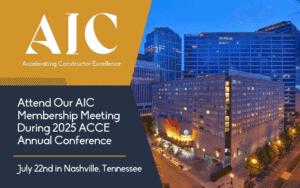There are several delivery methods used in construction that are designed to link together owners, designers, constructors, and subcontractors to drive toward project completion. One of the most common structures is construction management / construction manager at risk (CMAR), which is typically utilized in government, higher education, and other industries where project owners have tight budgets that they cannot exceed.
The CMAR method of construction management presents ethical challenges for construction contractors that enter into this type of agreement with a project owner. Let’s first examine what CMAR is and then review key ethical issues that could affect your projects.
What is the Construction Manager At Risk Delivery Method?
In the Construction Management at risk delivery method, the contractor acts as the owner’s representative and coordinates work between the design and construction teams. There are four key relationships involved in the structure:
- The owner contracts directly with the designer.
- The owner contracts directly with the construction manager.
- The construction manager contracts directly with the contractor/subcontractors.
- The construction manager has an informal working relationship with the designer.
With this delivery method, the construction manager at risk is responsible for the work to be completed. This means that construction managers must actively support the upstream relationship with the owner, the downstream relationship with the subs, and the lateral relationship with the designers. This can present ethical challenges in balancing the needs of the involved parties.
From a cost standpoint, the CMAR delivery method is a “cost plus” contract, which means that the owner pays for the cost of the work plus the construction manager’s fee. However, the construction manager provides a cap on how much the owner could pay for the work, which is referred to as a guaranteed maximum price (GMP).
The GMP is why project owners in the public sector prefer the CMAR project delivery method because they know the maximum cost they will be required to pay before any work begins.
Then, any costs incurred on the job that exceed the GMP are paid by the construction manager, which is why the construction manager is at risk for additional costs that exceed the expected costs. Because construction managers are on the hook for these excessive costs, this can introduce ethical challenges.
Ethical Issues in the CMAR Project Delivery Method
Consider these common ethical issues that construction managers need to work through when engaging in the CMAR project delivery method.
1. Who do we prioritize? The CMAR project delivery method automatically places construction managers in the role of an owner advocate. You answer to the owner. But, construction managers also need to support the teams that are performing the work and manage the relationship with designers. This can often create conflicts where construction managers try to find the best way to drive toward project completion without exceeding costs.
In practice, construction managers must learn how to structure contracts, policies, and procedures in a way that protects your interests, while also avoiding a conflict of interest with the owner. Otherwise, construction managers will constantly find themselves facing the dilemma of trying to make concessions to one or multiple parties involved in the project work, or trying to find ways to cut corners to get the work done within budget.
That’s why it’s important to learn how to prioritize the needs of all parties involved in the project work (including your company) so that you can avoid ethical compromises and strive for a higher level of project work.
2. Subpar work. It’s common in the construction industry to continually reduce a bid in an attempt to win the work over other companies bidding for the same work. But, when it comes time to do the actual work, contractors often realize that they cannot turn a profit because they have to keep reducing their bid to win the job.
When this scenario unfolds in the CMAR project delivery method, contractors feel pressured to find ways to reduce costs in an attempt to make up for how much they reduced their bid. This can lead to ethical issues:
- Not hiring the best talent for the job.
- Using cheap materials, equipment, and tools
- Cutting corners on quality and safety just trying to get the job done.
Delivering subpar work to protect your financial interests is not worth it. This approach often leads to re-work, scrap, safety problems, and other problems that eventually lead to increased costs and potentially larger issues.
Therefore, you can avoid this ethical by knowing the limits of how low you’re willing to cut your bid before the job is no longer doable – and not take the job. Or, if you do take the job, you should strive for strong collaboration with all involved parties to create healthy working relationships that will enable you to achieve efficiencies during the job. This will protect your financial interests.
3. What if costs come in lower than predicted? The guaranteed maximum price is designed to protect owners from incurring additional costs beyond the quoted price during the bidding phase. In other words, no hidden costs or surprises that could hurt the owner down the road.
However, what if the reverse is true where the project is near completion and the costs have actually fallen below the GMP? For example, how should construction managers approach the situation if the GMP is $15 million and the actual costs are only $10 million? This can present an ethical issue for construction managers regarding what to do with the difference.
- Should construction managers spend the difference in the final stages of the construction project?
- Should the cost savings be returned to the owner?
- Should construction managers keep this difference as their “reward” for being at risk during the project?
The answer comes down to doing right by the owner. Through a collaborative approach, you should engage in discussions with the owner as you approach the final stages of the project to discuss these situations. Don’t keep this information hidden; be open and honest so that you can find the right solution and set yourself up to be viewed favorably for the next project. Taking an ethical approach always pays off in the long run.
Find Support with Ethical Situations in Construction Management
We have identified some of the broad categories of ethical issues when the construction manager is at risk in project delivery. You may also experience specific challenges in interpersonal relationships, teamwork, delays caused by unforeseen issues (e.g. weather), and other challenges that could put your company on the path to incurring excessive costs.
No matter the challenge, remain focused on collaboration. Work with owners, subs, and designers to strive for a positive outcome where everyone wins. It may not always seem possible, and you may face ethical issues along the way, but stay focused on doing what’s right, not what seems most profitable at the moment when a key decision needs to be made.
– Sign up for more insights. We invite you to learn more about ethical issues in construction that your company might face on a regular basis. Through our email newsletter, we regularly share articles about construction ethics. We encourage you to sign up so that you can start receiving this important information directly to your inbox!
To sign up, simply enter your name and email address in the sign-up box at the bottom of this page. We look forward to supporting you and your company.




